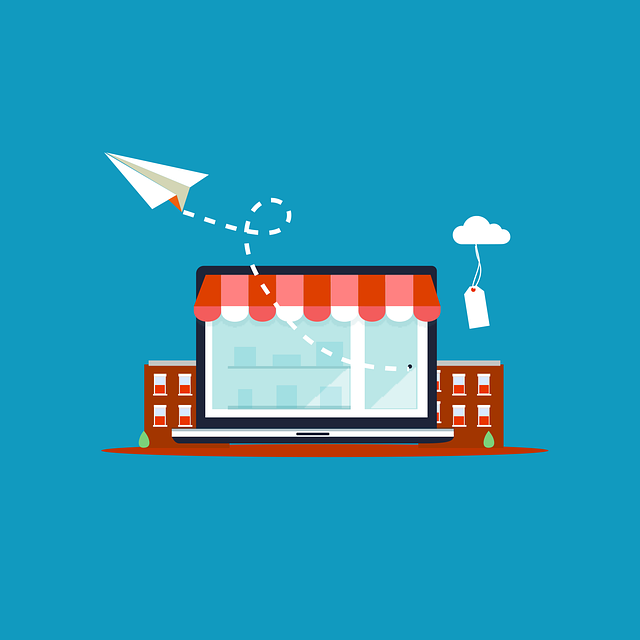Ecommerce automation for marketing automation uses AI tools like chatbots to streamline tasks, enhance customer experience, and free up resources. It enables 24/7 support, predicts customer behavior, optimizes listings, and automates emails, leading to targeted marketing, increased sales, and stronger relationships. This integration drives productivity, personalizes engagement, analyzes data for refined strategies, and gains a competitive edge through dynamic pricing and targeted campaigns.
In today’s digital landscape, ecommerce automation is no longer an option but a necessity. This powerful tool revolutionizes marketing by streamlining processes that were once manual and time-consuming. By automating tasks like email campaigns, inventory management, and customer service, businesses can focus on strategic initiatives. Ecommerce automation enhances personalized customer engagement, leading to higher conversion rates. Moreover, data-driven insights enable informed decisions, optimizing sales growth. Embrace ecommerce automation for marketing automation and stay ahead in the competitive market.
- Ecommerce Automation: Streamlining Marketing Processes
- Marketing Efficiency: Unlocking Time for Strategic Initiatives
- Personalized Customer Engagement: Enhancing Conversion Rates
- Data-Driven Decisions: Optimizing Sales and Growth
Ecommerce Automation: Streamlining Marketing Processes

Ecommerce automation revolutionizes marketing by streamlining processes that were once manual and time-consuming. Through AI-driven tools like sales chatbots and intelligent assistants, businesses can interact with customers 24/7, providing instant support and personalized recommendations. These innovations don’t just enhance customer experience; they also free up human resources to focus on strategic tasks, such as data analysis and content creation.
By integrating AI automation into marketing strategies, e-commerce businesses gain a competitive edge. An AI automation agency can help implement solutions that automate email campaigns, optimize product listings, and predict customer behavior. This level of efficiency allows for more targeted and effective marketing efforts, ultimately driving sales and fostering stronger customer relationships.
Marketing Efficiency: Unlocking Time for Strategic Initiatives

In today’s digital era, marketing success hinges on efficiency and strategic initiatives. Ecommerce automation revolutionizes this aspect by streamlining repetitive tasks, enabling marketers to focus on creative and high-value activities. By implementing AI agents in marketing automation, businesses can unlock significant time savings, enhancing their overall productivity.
This newfound freedom allows teams to delve into more complex strategies, such as personalized customer engagement, data analysis, and predictive analytics. The integration of ecommerce AI not only optimizes marketing efforts but also paves the way for innovative campaigns that cater to individual consumer needs. This strategic shift is pivotal in a competitive marketplace where efficient and intelligent automation can set businesses apart.
Personalized Customer Engagement: Enhancing Conversion Rates

In today’s digital era, ecommerce automation is a game-changer when it comes to personalized customer engagement and enhancing conversion rates. By leveraging marketing automation tools powered by AI agents like chatbots, businesses can deliver tailored experiences that cater to individual shopper needs and preferences. These intelligent workflows enable dynamic content delivery, allowing for targeted promotions and personalized product recommendations at every touchpoint.
For instance, an AI chatbot can greet customers with relevant offers based on their browsing history, past purchases, or specific interests. This level of customization creates a sense of connection and fosters trust, ultimately driving higher conversion rates. Moreover, automated systems can collect valuable customer data over time, enabling businesses to refine marketing strategies and create even more compelling personalized experiences.
Data-Driven Decisions: Optimizing Sales and Growth

In today’s data-driven world, ecommerce businesses that leverage automation are at a significant advantage when it comes to making informed decisions. Ecommerce automation for marketing strategies allows retailers to harness vast amounts of customer data, providing insights into purchasing behaviors and preferences. By utilizing AI automation and chatbot automation tools, companies can personalize their marketing efforts like never before. For instance, ai agents can analyze browsing patterns, purchase history, and even social media interactions to create detailed customer profiles.
This level of customization enables targeted campaigns that resonate with individual shoppers, fostering stronger connections and increasing the likelihood of conversions. Furthermore, automated systems can continuously optimize sales strategies by adjusting pricing, promoting relevant products, and delivering timely discounts based on real-time data analysis. As a result, businesses experience growth not only in terms of customer acquisition but also in retaining and delighting existing clientele.
Ecommerce automation is not just a trend, but a necessity in today’s competitive digital landscape. By streamlining marketing processes, it frees up valuable time for businesses to focus on strategic initiatives. This technology enables personalized customer engagement, leading to higher conversion rates and stronger customer relationships. Moreover, data-driven insights from automated systems empower marketers with the knowledge to optimize sales and drive sustainable growth. Embracing ecommerce automation for marketing is a game-changer, ensuring businesses stay ahead in their industry.
